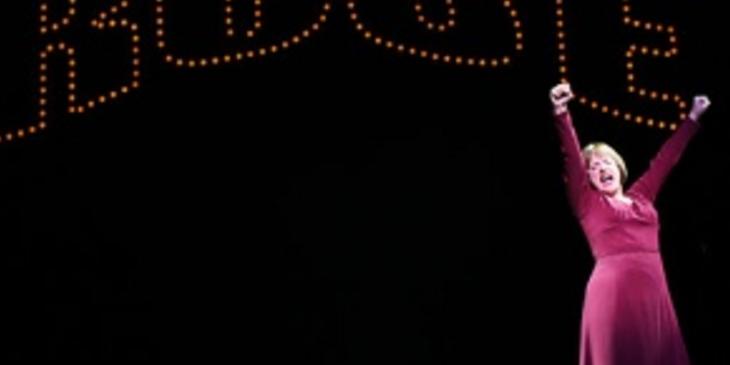
Mother's Day: Top 10 Mothers in Musical Theatre
With Mother's Day this weekend in the UK, we decided to take a look at our Top 10 favourite mothers on-stage in musical theatre. Which stage mother will take the top spot? We'll "give you three guesses; reduce it to two"...
The first of two entries for American composer William Finn, proving that he's certainly someone who knows how to write an off-beat stage mother. In his 1998 musical A New Brain, Finn explores his own life following arteriovenous malformation, in a show that deals with the frustration and expectation of creating art as well as coping with high level brain surgery. His central character Gordon is not only struggling with the physical condition that suddenly hinders his ability to work, but his greatest fear comes from the thought that he may die with great songs still within his head. His relationship with his mother, Mimi, is one of the more complex elements of the show, and her character boasts some of the most powerful moments in the piece. In "The Music Still Plays On", Mimi imagines the funeral of her son and takes the audience through a picture of their somewhat stunted relationship.
Mothers are somewhat lacking in the musicals of Rodgers and Hammerstein. Nelly Forbush, Maria Rainer, Aunt Eller, Nettie Fowler and Mrs Anna herself all find themselves stepping into the maternal position within each of their respective musicals - taking care of children who do not belong to them. The character of Mrs Anna in their 1951 musical The King and I acts as both surrogate mother to the King of Siam's countless children and mother to her own son Louis, providing an interesting dynamic as East meets West in this historic power struggle between two nations, played out between two strong and stubborn characters. Mrs Anna's softer side is the immediate focus of the show, with the opening number "I Whistle a Happy Tune" used to teach Louis how to cope with fear. Underneath her hooped skirt, she proves herself to be a powerful, strong-willed yet compassionate mother, and a paragon of musical theatre maternity.
The iconic documentary Grey Gardens is perhaps the ultimate behind the scenes look at an unconventional mother-daughter relationship. Doug Wright, Michael Korie and Scott Frankel's 2006 musical, which was recently seen at the Southwark Playhouse in London, takes the relationship between Edith Ewing Bouvier Beale ("Big Edie") and her daughter Edith Bouvier Beale ("Little Edie") and creates a two act musical that's part fictional and part historical. The first act creates the relationship between Big Edie and her soon-to-be wed daughter Little Edie, and shows how household tensions and colourful mannerisms has the ability to sour their bond. The second act transports audiences to thirty years later, and we see how their eccentricities have developed as the pair live in squalor at their decaying Grey Gardens estate. This exquisite character study is one of the most interesting musicals to ever explore motherhood on stage.
Composer Stephen Sondheim has often talked about his relationship with his mother and how it has found its way into his work. Once again, motherhood isn't a key theme in many of his musicals, but one of the most interesting mother-daughter relationships in his canon is that of the young Fredrika Armfeldt who is left to be looked after by her Grandmother, whilst her mother Desiree lives "The Glamorous Life" of an actress on tour. Whilst the relationship is often strained, Fredrika becomes somewhat of a confidante as Desiree plots for a "Weekend in the Country" to ensnare her former lover Fredrik Egerman. "The Glamorous Life" is one of Sondheim's most famous songs, and was rewritten for the film version to give an extended look at the mother-daughter relationship, and what a life on the road means for her daughter.
The Abba jukebox musical Mamma Mia! contains one of the most fun stage mothers ever created. As her daughter Sophie invites three potential fathers to her wedding, Donna and her two best friends recreate their time performing together as Donna and the Dynamos and on sunny Greek island to the soundtrack of one of the greatest bands of all time. It's hardly The Glass Menagerie, but it's a perfect relationship that allows hits such as "Super Trouper", "Dancing Queen", "Money Money Money" and "Waterloo" to be effortlessly shoehorned into a stage musical. The film adaptation is one of the biggest movie musicals of all time, and gave us the chance to see Meryl Streep belt this showstopper on an idyllic clifftop complete with red scarf and a confused looking Pierce Brosnan.
Andrew Lippa's chamber musical presents one of the most memorable stage mothers, using a unique concept that allows the audience to observe a total journey in a character's life. Beginning the first act with brother and sister John and Jen, we see how the pair have both been let down by their parents, and only by sticking together do they manage to grow and develop into their adult selves. The second act takes a twist, with older Jen now looking after her son John, and we are given a wonderful insight into a mother and son relationship as the pair grow older and deal with embarrassment on the baseball field to leaving for summer camp and later college. The character of Jen is one of the most painful stage mothers in a musical, but a perfectly written and realistic one - brought to life by a number of outstanding musical theatre standards.
If Valium is your favourite colour and you like a stage mother who comes with a side dish of bipolar-ism, then this Pulitzer Prize winning musical is for you. Next to Normal is a suburban rock musical by Brian Yorkey and Tom Kitt follows a mother (Diana) who struggles with worsening bipolar disorder and has to face the illness and its affects on her family. Originally performed on Broadway by Tony Award-winner Alice Ripley, it was a genuinely powerful production that has had the most profound effect on modern musical theatre in the years since, expanding the scope of subject matter in the American musical.
The second entry for William Finn sees the mother of Jason, Trina, battle with the fact that her husband has left her for another man as well as finding herself in love with her psychiatrist. Originally presented as two one act musicals, 'March of the Falsettos' and 'Falsettoland', the production comes together to form Falsettos, giving a powerful study of a modern family unit on the brink. The show has never been performed together in London, but a Broadway revival was recently announced. We have a very particular wishlist for who can bring Trina to the stage in 2016, but until then we're more than happy watching Barbara Walsh "Breaking Down".
One of the strongest stage mothers ever to grace a musical has to be Willy Russell's Mrs Johnstone form the epic British musical Blood Brothers. Working as a cleaner with seven hungry mouths to feed, Mrs. J find herself expecting twins, and enters into a pact with her barren employer Mrs Lyons to give her one of her babies. As she promises to keep it a secret for as long as they live, her superstitions are played upon and Russell presents a compelling study of the English class system that results in tragic consequences. With the show's biggest number "Tell Me It's Not True" closing the show, it's a role that requires incredible skill as well as maternal truth.
There can only ever be one winner in any countdown of mothers on stage. The most fierce stage mother of all time, Mama Rose, is iconic and incomparable. Jule Styne and Stephen Sondheim's musical Gypsy is based on the real life story of Gypsy Rose Lee and her relationship with her pushy stage mother. The show is consistently considered to be one of the greatest musicals of all time, with the character of Mama Rose challenging the best performers from around the world. Wars have been started with less passion than the debate surrounding 'who performed it best' - with our very own Imelda Staunton knocking the role out of the park at the Savoy Theatre in 2015. I'll leave you with Bernadette Peters delivering the final number "Rose's Turn" as she questions what it means to give up your dreams to be a mother.
Originally published on









